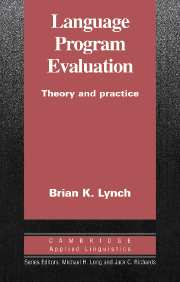Book contents
- Frontmatter
- Contents
- Series editors' preface
- Preface
- 1 Introduction
- 2 Historical background
- 3 Validity
- 4 Positivistic designs
- 5 Naturalistic designs
- 6 Quantitative data gathering and analysis
- 7 Qualitative data gathering and analysis
- 8 Combining positivistic and naturalistic program evaluation
- 9 Conclusions
- References
- Author index
- Subject index
4 - Positivistic designs
Published online by Cambridge University Press: 05 October 2012
- Frontmatter
- Contents
- Series editors' preface
- Preface
- 1 Introduction
- 2 Historical background
- 3 Validity
- 4 Positivistic designs
- 5 Naturalistic designs
- 6 Quantitative data gathering and analysis
- 7 Qualitative data gathering and analysis
- 8 Combining positivistic and naturalistic program evaluation
- 9 Conclusions
- References
- Author index
- Subject index
Summary
In Chapter 2 I discussed the quantitative–qualitative debate, or paradigm dialog, and in Chapter 3 I outlined the differences between the two perspectives in terms of what counts as evidence, or validity. This chapter presents a series of models, or designs, for carrying out a program evaluation from the perspective of the positivistic paradigm. By the term paradigm I mean, as indicated in Chapter 2, more than just a particular type of evaluation data and a particular set of ways to collect and analyze it. In addition, this choice of data and analysis implies the philosophical basis and conceptualization of validity discussed in Chapters 2 and 3 as positivistic. For the most part, the following discussion recapitulates the classic research designs of Campbell and Stanley (1966) and Cook and Campbell (1979), which still form the basis for positivistic evaluation (cf. Fitz-Gibbon and Morris 1987). Readers who are already familiar with these designs may wish to skip ahead to the final design presented in this chapter, labeled here as structural models.
When the evaluation audiences and the evaluation goals require evidence of whether, or how well, the program is working, the traditional choice of a design for gathering and analyzing information is one of a set of experimental or quasi-experimental designs originally presented and discussed by Campbell and Stanley (1966). These designs all involve the gathering of quantitative data (i.e., a measurement of some kind) from what is traditionally referred to as the experimental group and, if possible, from what is traditionally referred to as the control group.
- Type
- Chapter
- Information
- Language Program EvaluationTheory and Practice, pp. 70 - 79Publisher: Cambridge University PressPrint publication year: 1995



